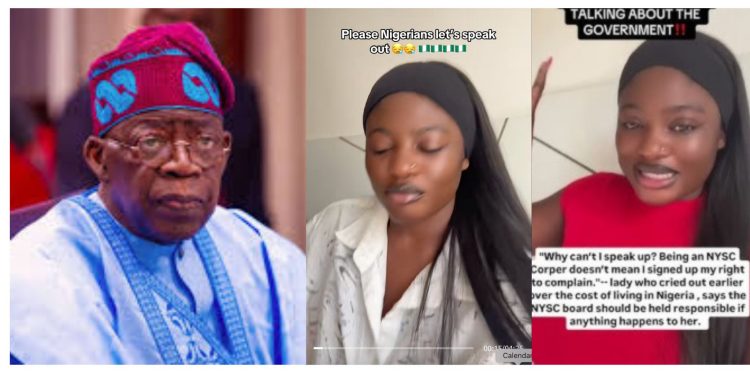A serving National Youth Service Corps (NYSC) member in Lagos State has raised an alarm over an alleged threat from the NYSC board after she criticised President Bola Ahmed Tinubu’s government in a viral social media post.
The corps member, who shared her grievances on TikTok, lamented the rising cost of goods in Nigeria and described the Tinubu administration as “terrible.” She also accused the government of neglecting the economic hardship faced by citizens.
Following the video’s circulation on social media, the corps member received a warning via a phone call from an NYSC staff cautioning her about making political statements online.
The development has sparked reactions from Nigerians, with many questioning whether corps members should be restricted from expressing their views on governance and national issues.
Some Nigerians took to social media platform X (formerly called Twitter) to express their reactions:




In July 2024, the Nigerian government approved an increase in the national minimum wage from ₦30,000 to ₦70,000 per month, following extensive negotiations with labour unions to address the escalating cost of living.
This adjustment aimed to alleviate financial pressures on workers amid rising inflation and economic challenges.
In line with this policy, the National Youth Service Corps (NYSC) announced an increase in corps members’ monthly allowances from ₦33,000 to ₦77,000, reflecting the new minimum wage structure.
The NYSC Director-General, Brigadier General Yushau Ahmed, assured corps members that the increment would commence by February 2025.
However, as of March 2025, both the implementation of the ₦70,000 minimum wage for federal workers and the ₦77,000 allowance for NYSC members have faced significant delays.
Federal employees continue to receive the previous minimum wage of ₦30,000, and corps members are still paid ₦33,000, contrary to the government’s commitments.
These unfulfilled promises have led to widespread frustration among workers and corps members, who feel neglected despite the government’s assurances.
The delays have exacerbated the financial hardships faced by many Nigerians, raising questions about the government’s commitment to improving the living standards of its citizens.
The situation has also sparked debates on social media platforms, with many questioning the government’s accountability and the effectiveness of its policies in addressing the economic crisis.
The unmet promises have become a focal point of public discourse, reflecting the growing discontent among the populace.









